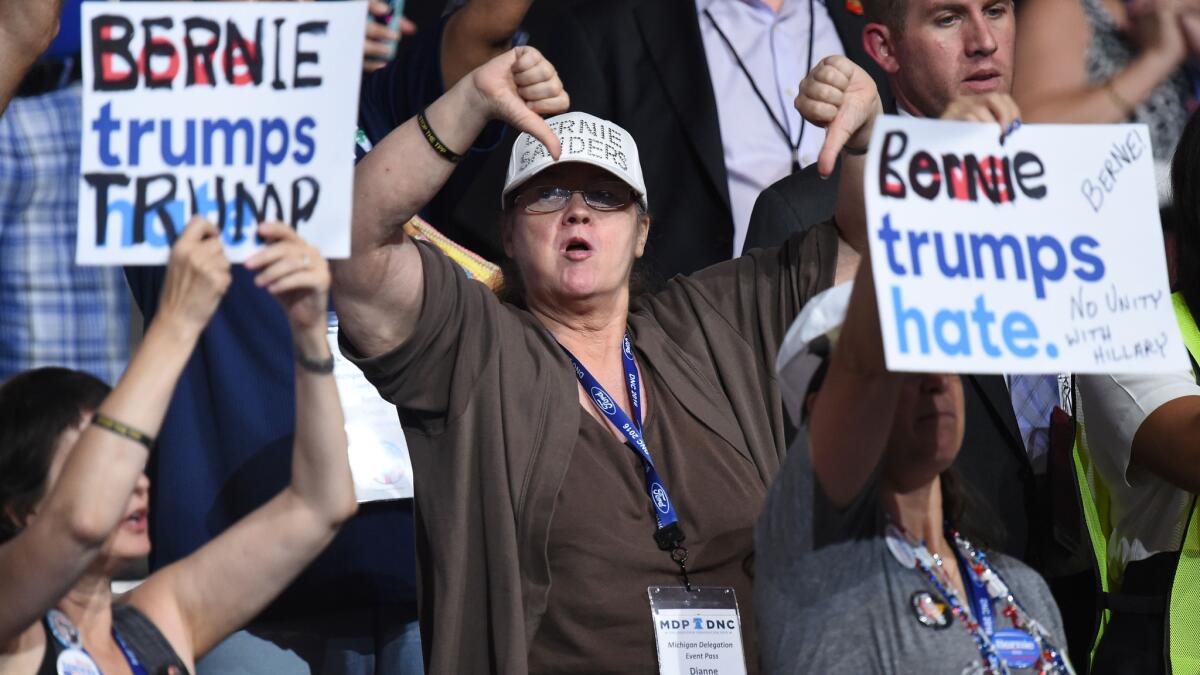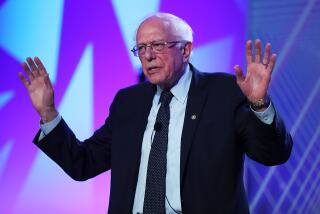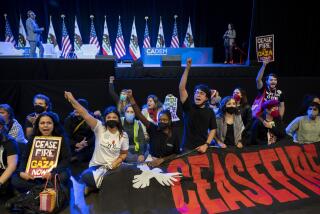Forget unity: Sanders himself is booed by his loyalists

They’ve followed Bernie Sanders for more than a year, from the college campuses of Iowa to the dusty fields of California, but as the Democratic National Convention began Monday, the army of loyalists the Vermont senator amassed during his insurgent campaign for president broke loose from his grasp.
Sanders delegates marched the streets in Philadelphia, with some accusing Hillary Clinton of stealing the Democratic nomination and echoing Republican taunts to “lock her up.” Outside the convention hall, they waved Sanders signs and chanted, “We won’t vote for Hillary.”
And at a rally to thank supporters, Sanders himself was booed when he suggested that their best chance to further their movement was to cast a ballot for Clinton and her designated running mate, Sen. Tim Kaine of Virginia.
Polls show most Sanders voters plan to cast ballots for Clinton in the November election, and even some of her toughest critics insist that they don’t want Donald Trump to win the White House.
The cacophony of outrage that marked the first day of the Democratic convention, however, underscored the entrenched resistance to Clinton among left-wing activists.
The noisy protests, which preceded Sanders’ own long-sought speech at the convention, also suggested that he may no longer be the pied piper of a political movement that he transformed from a fringe campaign into a juggernaut.
“He’s not running the show,” said Norman Solomon, the veteran activist who heads the Bernie Delegates Network, a group unaffiliated with the campaign.
Live coverage from the Democratic National Convention in Philadelphia »
The protests may have been the inevitable conclusion to a candidacy that for months stoked supporters’ belief that the process was rigged against them. When Sanders and his top lieutenants now ask his delegates to respect the outcome of that process, many reject the idea.
Symone Sanders, the former spokeswoman for the Sanders campaign, tried to beat back concerns about the primary process with a message on Twitter.
“No one stole this election,” she wrote. “We lost. It’s a hard reality for some.”
It’s not a reality that some of Sanders’ supporters are willing to accept.
“In my eyes, he won the election; they just took it away from him,” said Andrea Perez, who traveled from Miami to Philadelphia to protest the convention.
The situation is harder to control because of the nature of Sanders’ candidacy, one that the senator has always described as a grass-roots crusade rather than a solo effort. And it reflects his campaign’s roots in protest movements like Occupy Wall Street rather than party hierarchy.
“The Bernie delegation has never been a group to take marching orders,” said Karen Bernal, the co-leader of California’s Sanders delegation.
Sanders tried to tamp any outbursts within the convention hall, sending a text to delegates saying, “I ask you as a personal courtesy to me to not engage in any kind of protest on the floor.”
In a longer email, Sanders wrote, “Our credibility as a movement will be damaged by booing, turning of backs, walking out or other similar displays.”
But as the convention session began, some weren’t willing to heed Sanders’ call for civility, chanting his name and booing the mention of Clinton. The raucous behavior didn’t surprise Abigail Field, 45, a New York delegate for Sanders who wore a Robin Hood-style hat to show her support for a new tax on Wall Street transactions.
“These are not party loyalists,” she said. “It’s a bottom-up, small-d democratic push for social justice.”
After months of listening to Sanders rail against the political establishment, it wasn’t surprising that his supporters have resisted backing Clinton. Some still hoped to make Sanders the nominee during the convention, raising questions about whether the primary process was fair.
“If the process itself was rigged and was not democratic, I think he has an opening,” said Sanjay Patel, a delegate from Florida who modified his jacket with battery-powered lights to spell out “Feel the Bern” on his back.
Many Sanders activists are convinced that one aspect or another of the primary was rigged against their candidate, pointing to rules they believe prevented his supporters from casting ballots in his favor.
Their anger was rekindled in recent days by internal Democratic Party emails that showed party officials writing disrespectfully about Sanders and discussing ways to slow his progress, rather than remaining neutral.
The continued tension was striking in light of high-profile agreements between Clinton and Sanders to advance many of the Vermont senator’s goals.
The platform includes calls for a $15-an-hour minimum wage and stronger action on climate change. The party is creating a commission intended to sharply reduce the influence of superdelegates, elected leaders and party officials who can choose which candidate to support in the primary.
And Debbie Wasserman Schultz, the chair of the Democratic National Committee, is resigning over the leaked emails.
“What we’re watching happen reflects an ongoing tension between the left and Democratic Party politics,” said Sally Kohn, a former grass-roots organizer who serves as a CNN commentator.
“The left is always going to say, we want more, we want more, we want more.”
Sanders supporters also remain sensitive to any slight, real or perceived. Some, for example, were furious Clinton named Wasserman Schultz as an “honorary chair” of her campaign.
For them, putting Wasserman Schultz on her team, even in a symbolic capacity, felt like an insult.
“It’s showing disrespect to Bernie Sanders,” said Lauren Niedel, a delegate from Rhode Island.
She helped circulate petitions to ensure Sanders gets a roll call vote on the floor Tuesday, allowing his delegates to show their support for him.
“The goal is to show his campaign is valuable and valid,” Niedel said, “not to be marginalized.”
Times staff writers David Lauter, Matt Pearce, Colleen Shalby and Sarah D. Wire contributed to this report.
Twitter: @chrismegerian
ALSO:
Updates on California politics
Updates from the campaign trail
Will Sanders’ delegates take a stand or work with Clinton Democrats?
Hillary Clinton has all kinds of policies — that’s the problem as she seeks a coherent message
More to Read
Get the L.A. Times Politics newsletter
Deeply reported insights into legislation, politics and policy from Sacramento, Washington and beyond. In your inbox three times per week.
You may occasionally receive promotional content from the Los Angeles Times.







